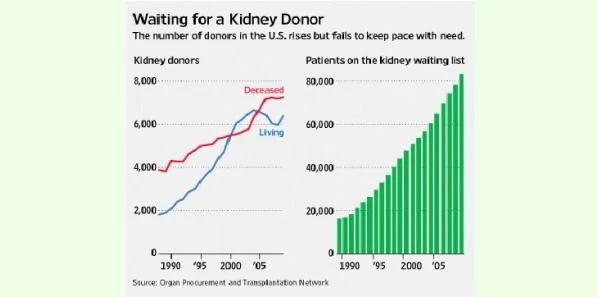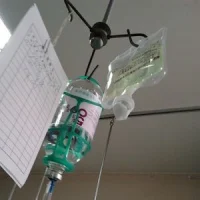Based on a new study in the US, living organ donors who later need a kidney go to the top of the transplant waiting list and get excellent-quality kidneys compared to their counterparts who were not donors. The finding tends to confirm that a US policy giving priority to previous organ donors on the transplant waiting list is working, according to Dr. Peter P. Reese, the study's lead author.
"A lot of donors I meet want reassurance that if they do reach end-stage renal disease they'll receive priority on the transplant list," said Dr. Reese, of Renal-Electrolyte and Hypertension Division, Perelman School of Medicine, University of Pennsylvania. "I think this study provides an important piece of reassurance." Results of the study have been published in the Journal of the American Society of Nephrology.
For the study, Dr. Reese and colleagues compared 239 prior organ donors to similar non-donors who were wait-listed for transplants from 1996 through 2010. Their findings include:
"The new study is an important validation that the system works," Dr. Dorry Segev told Reuters Health. Dr. Segev is an epidemiologist and transplant surgeon at Johns Hopkins School of Medicine in Baltimore, Maryland and was not involved with Dr. Reese's study.
"We in transplantation have put in a rescue system for the rare kidney donor who happens to develop kidney failure...and this is evidence that this system is working well," Dr. Segev said. In the US, living organ donors have been granted priority for kidneys procured from deceased donors since 1996.
According to Dr. Reese's team, the selection criteria for living donors are designed to identify individuals who are at low risk for ultimately needing kidney transplants themselves. Recent research has found, however, that although the risk of a donor later needing a new kidney remains low, it is eight times higher than the risk for the average healthy person. "It's still a very rare event," Dr. Reese pointed out.
During the years of the study, there were more than 84,000 living kidney donors in the US alone, according to data from the Organ Procurement and Transplantation Network. OPTN is the unified transplant network established by the United States Congress under the National Organ Transplant Act of 1984.
Dr. Segev said his research shows that the absolute risk of kidney failure for prior donors is 31 out of 10,000, compared to 27 out of 10,000 for non-donors. He was not surprised to see that the system of prioritising donors is working. However, he said the question that continues to concern him is whether prior donors who develop kidney failure are being sent to transplant centres for evaluation. The doctor is studying that question.
Since the 1990s, advances in immune-suppression have made it safer to receive organs from unrelated donors, Dr. Reese's team said. Less invasive surgical techniques also make it easier to donate.
"We have to really impress on donors that if they donate they're committing to a healthy lifestyle," Dr. Reese emphasised. "There is definitely risk, but I think my job is to choose people whose risk is low, reasonable and who are not ambivalent."
Source: Medscape.com
Image Credit: Organ Procurement and Transplantation Network
"A lot of donors I meet want reassurance that if they do reach end-stage renal disease they'll receive priority on the transplant list," said Dr. Reese, of Renal-Electrolyte and Hypertension Division, Perelman School of Medicine, University of Pennsylvania. "I think this study provides an important piece of reassurance." Results of the study have been published in the Journal of the American Society of Nephrology.
For the study, Dr. Reese and colleagues compared 239 prior organ donors to similar non-donors who were wait-listed for transplants from 1996 through 2010. Their findings include:
- The median wait for a new kidney was 145 days for the donors, compared to 1,607 days for patients who were similar to them but had not ever donated an organ.
- Five percent of prior organ donors died before receiving a transplant, compared to 13 percent of the matched non-donor candidates.
"The new study is an important validation that the system works," Dr. Dorry Segev told Reuters Health. Dr. Segev is an epidemiologist and transplant surgeon at Johns Hopkins School of Medicine in Baltimore, Maryland and was not involved with Dr. Reese's study.
"We in transplantation have put in a rescue system for the rare kidney donor who happens to develop kidney failure...and this is evidence that this system is working well," Dr. Segev said. In the US, living organ donors have been granted priority for kidneys procured from deceased donors since 1996.
According to Dr. Reese's team, the selection criteria for living donors are designed to identify individuals who are at low risk for ultimately needing kidney transplants themselves. Recent research has found, however, that although the risk of a donor later needing a new kidney remains low, it is eight times higher than the risk for the average healthy person. "It's still a very rare event," Dr. Reese pointed out.
During the years of the study, there were more than 84,000 living kidney donors in the US alone, according to data from the Organ Procurement and Transplantation Network. OPTN is the unified transplant network established by the United States Congress under the National Organ Transplant Act of 1984.
Dr. Segev said his research shows that the absolute risk of kidney failure for prior donors is 31 out of 10,000, compared to 27 out of 10,000 for non-donors. He was not surprised to see that the system of prioritising donors is working. However, he said the question that continues to concern him is whether prior donors who develop kidney failure are being sent to transplant centres for evaluation. The doctor is studying that question.
Since the 1990s, advances in immune-suppression have made it safer to receive organs from unrelated donors, Dr. Reese's team said. Less invasive surgical techniques also make it easier to donate.
"We have to really impress on donors that if they donate they're committing to a healthy lifestyle," Dr. Reese emphasised. "There is definitely risk, but I think my job is to choose people whose risk is low, reasonable and who are not ambivalent."
Source: Medscape.com
Image Credit: Organ Procurement and Transplantation Network
Latest Articles
kidney failure, organ donation, kidney transplant, donor
Based on a new study in the US, living organ donors who later need a kidney go to the top of the transplant waiting list and get excellent-quality kidneys...










